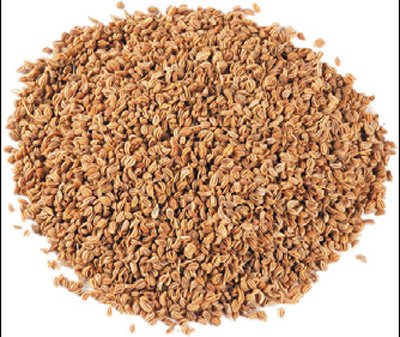Ajwain
Ayurvedic Medicine

Ajwain
Bishop's weed (E), Ajwain (H):
Deliciously aromatic, ajwain is a wonderful remedy for sluggish digestion and coughs. A truly warming seed.
Digestion Specifically indicated for low digestive fire (mandagni). It combines warming digestive pungency with antispasmodic and bitter activity; antiflatulent, digestive cramps and sluggish digestion. Also benefits worms and fungal infections of the intestines (Swami Prakashananda Ayurveda Research Centre 1992). It is specific for digesting ama and stagnant toxins within the digestive tract. It works on samana vayu, the prana that controls digestion in the centre of the abdomen, and stimulates pacaka pitta, the pitta subtype overseeing digestion in the small intestine. It is specifically indicated for hiccups, belching and rebellious apana vata moving upwards instead of downwards. Lungs As an antispasmodic it effectively eases wheezing and constricted lungs due to vata and cold. Used where there is white and copious phlegm with high avalambaka kapha. Also beneficial in sinus and nasal congestion; it stimulates and opens the channels of the head (manovahasrotas). Nerves Ajwain relaxes tension in the nervous system; especially in the lower abdomen, reproductive system and lungs. Use in menstrual cramping, colic, wheezing and general anxiety. As it benefits the whole nervous system it can help to lift the sluggish lethargy of mild depression. It normalises the flow of vata and all the pranas around the body. By aiding udana vayu, the prana regulating speech and enthusiasm, and by clearing the lungs and throat, it opens the way for clear communication . Urine As a warming diuretic it can clear urinary frequency from cold. It also benefits painful urination caused by calculi.
 Shatavari
Shatavari Anthrapachaka
Anthrapachaka Trivrut
Trivrut Rhubarb
Rhubarb Brahmi
Brahmi Lemon And Lime
Lemon And Lime Chrysanthemum
Chrysanthemum Bala
Bala Tulsi
Tulsi Amalaki
Amalaki Gotu Kola
Gotu Kola Vamsa Lochana
Vamsa Lochana Test your English Language
Test your English Language  Tips to get ready for New Year
Tips to get ready for New Year Hanuman
Hanuman Benefits of Iceberg lettuce
Benefits of Iceberg lettuce Longest Rail Tunnels In the World
Longest Rail Tunnels In the World Best Cars for Winter
Best Cars for Winter Benefits of Mustard Seeds
Benefits of Mustard Seeds Best Cities for young People
Best Cities for young People Best Cricketer
Best Cricketer




